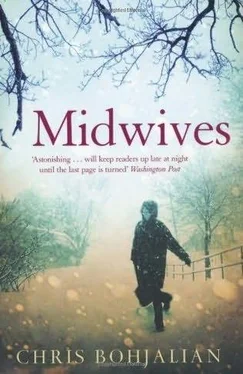Chris Bohjalian - Midwives
Здесь есть возможность читать онлайн «Chris Bohjalian - Midwives» весь текст электронной книги совершенно бесплатно (целиком полную версию без сокращений). В некоторых случаях можно слушать аудио, скачать через торрент в формате fb2 и присутствует краткое содержание. Жанр: Современная проза, на английском языке. Описание произведения, (предисловие) а так же отзывы посетителей доступны на портале библиотеки ЛибКат.
- Название:Midwives
- Автор:
- Жанр:
- Год:неизвестен
- ISBN:нет данных
- Рейтинг книги:5 / 5. Голосов: 1
-
Избранное:Добавить в избранное
- Отзывы:
-
Ваша оценка:
- 100
- 1
- 2
- 3
- 4
- 5
Midwives: краткое содержание, описание и аннотация
Предлагаем к чтению аннотацию, описание, краткое содержание или предисловие (зависит от того, что написал сам автор книги «Midwives»). Если вы не нашли необходимую информацию о книге — напишите в комментариях, мы постараемся отыскать её.
Midwives — читать онлайн бесплатно полную книгу (весь текст) целиком
Ниже представлен текст книги, разбитый по страницам. Система сохранения места последней прочитанной страницы, позволяет с удобством читать онлайн бесплатно книгу «Midwives», без необходимости каждый раз заново искать на чём Вы остановились. Поставьте закладку, и сможете в любой момент перейти на страницу, на которой закончили чтение.
Интервал:
Закладка:
But the sunshine always reassured me that the storms were never as bad as they'd sounded, and usually I felt that way after my parents' fights when we'd all have breakfast together the next day. I know my parents never stopped loving each other-passionately, madly, chaotically-and one or the other of them was always there for me.
Given the amount of time I spent being transported places by my father when I was growing up, it shouldn't surprise me that my first exposure to the Bedfords was with him. But of course it was through my mother that our families' fates were linked: Mrs. Bedford was one of my mother's patients and the center of the very public tragedies our two families faced.
Mrs. Bedford-Charlotte Fugett Bedford, I would learn later in the newspapers-was from Mobile, Alabama. (It's tempting to refer to her as "one of the Mobile Fugetts," but that would imply a lineage more impressive than the generations of sharecroppers and bootleggers and petty thieves that I know were in fact her ancestry.) Her husband, the Reverend Asa Bedford, was from a tiny Alabama town, farther in from the coast, called Blood Brook. Years later, when I decided to visit the area, I stared at the small dot that marked it on an auto club map of the state for hours at a time before finally venturing there. When I arrived, I was at once frightened and surprised by the accuracy of my imagination. It was a dirt crossroad of shanties, the air thick with mosquitoes and flies, and a heat that would wilt Vermont gardens in minutes.
In my mind there was no school in Blood Brook, and indeed there was not. I had always envisioned a church there to inspire Asa, and indeed there was. White paint peeled off its clapboards like rotting skin, and spiked grass grew tall in the cracks of its front walk: With the end of the world imminent, there was little reason to paint or weed.
That geographic background noted and my own cattiness revealed, I should also note that I liked the Bedfords very much when I met them. Most people did: They were apocalyptic eccentrics, but she was sweet and he was kind. I know they had followers and I assume they had friends.
When they came to Vermont, the Bedfords lived thirty minutes north of us in Lawson, and Reverend Bedford's small parish was another twenty or thirty minutes north of that, in Fallsburg. His church-a renovated Quaker meetinghouse ten miles northwest of Newport, on a two-lane state highway with nothing around it but trees-was an easy morning walk to the Canadian border. At its peak, Bedford's congregation consisted of roughly five dozen parishioners from Vermont and Quebec's Eastern Townships who believed with all their hearts that the Second Coming would occur in their lifetime.
When the Bedfords arrived in the Green Mountains, convinced that Vermont's rural Northeast Kingdom was ripe for revival, they had one child, a seven-year-old boy they named Jared, but whom Mrs. Bedford always called Foogie-a diminutive, of sorts, for her own family's name.
Even if my mother had not been a midwife, I would have met the Bedfords, although I don't imagine I would have gotten to know them as well as I did, or that today our families' two names would be linked in so many people's minds. And although the first link between us was byzantine, it was as natural, cohesive, and inextricable as an umbilical cord. Foogie was schooled at home by his parents, which meant that my friend Rollie's mother visited the family periodically as an examiner for the state education department. It was Mrs. McKenna's responsibility to make sure that the family was adhering to the basics of the required curriculum. Perhaps because the Bedfords were new to Vermont, perhaps because Mrs. McKenna wanted to be sure that young Foogie had as much exposure as possible to the world beyond his father's church, she recommended her daughter, Rollie, as a diligent and responsible baby-sitter for the boy.
It was therefore in the capacity of friend of the baby-sitter that I first met the Bedfords, when my father drove me there late on a Saturday afternoon to keep Rollie company while she took care of Foogie that night. Rollie had been there since breakfast, while the Reverend and Mrs. Bedford were in southern New Hampshire at a Twin State Baptist conference. Although they weren't Baptists, Asa was usually able to find a family or two at these sorts of weekend retreats who would listen with interest to his beliefs, and consider an invitation to his church.
Their house was modest and old, and buried in deep wood at the end of a long dirt road. A century ago the woods had been meadows and farmland, my father observed the first time he drove me there, motioning out the window of the Jeep at the squat, mossy stone walls we passed as we bounced down the road. I couldn't imagine such a thing; I couldn't imagine someone clearing forest this thick in an era before chain saws and skidders.
Although most Vermont hill farmers were careful to construct their homes on the peaks of their property, there were some who for one reason or another chose valleys-perhaps because a dowser had found a shallow well there. Whoever had built the Bedford place a hundred years ago was among those exceptions. I could feel myself lurching forward in the Jeep as we descended deeper into the woods, and the vehicle's lap belt pressed against my waist.
My first impression of the Bedford place-an impression garnered two months before my thirteenth birthday-was that someone with little money or carpentry skill was working hard to keep it tidy. The grass was high in the small lawn surrounding the house, as if it hadn't been cut yet that spring (Memorial Day was just over a week away), but someone had laid square pieces of bluestone in a path from the dirt road to the front door so recently that I could actually see the prints from a human palm pressed flush in the dirt against the stones' edges. Two of the windows on the first floor had long cracks sealed with white putty, but behind the panes were delicate, lacy curtains. Many of the clapboards were rotting, but the nails that were slammed through them to keep them attached to the exterior walls were so new that the sides of the house were sprinkled with small silver dots.
The place was a compact two-story box, its roof's angle wide and gentle, its walls the yellow of daffodils. The paint had begun to flake, but it was still bright enough that when the Reverend Bedford started up his car to drive Rollie and me home that night, the beams from his headlights gave the house a sulfurous glow.
The Saturday I met the three Bedfords-Foogie in late afternoon and the Reverend and his wife close to ten o'clock at night-the cluster of cells that would become Veil (spelled with an e for reasons I imagine only Asa fully understood) did not yet exist, but would be formed very soon.
Whatever fears of or enthusiasms for the apocalypse Asa harbored inside him were not usually apparent in his appearance. His face was almost as round as his eyeglasses, and his hair had receded back far on his head; what hair he had, however, was thick and reddish brown. Most of the times that I saw him he was wearing crisp, well-ironed white shirts, fully buttoned. He was, like my father, a man who I assumed had been quite thin when he was young, but was now growing wide and heavyset around the middle.
He looked like the sort of rural businessman I might observe in St. Johnsbury or Montpelier: not as sophisticated, in my eyes anyway, as the executives I'd see on television or, of course, my own father.
He was also one of those rare and special adults who was capable of being every bit as silly as children. And Foogie adored him for it. I saw Asa pretend to be a mule and walk the lawn on his hands and knees, snorting and neighing and carrying his delighted son on his back. I witnessed the preacher waddling like a duck for Foogie, and making up rhymes to teach the boy how to spell certain sounds:
Читать дальшеИнтервал:
Закладка:
Похожие книги на «Midwives»
Представляем Вашему вниманию похожие книги на «Midwives» списком для выбора. Мы отобрали схожую по названию и смыслу литературу в надежде предоставить читателям больше вариантов отыскать новые, интересные, ещё непрочитанные произведения.
Обсуждение, отзывы о книге «Midwives» и просто собственные мнения читателей. Оставьте ваши комментарии, напишите, что Вы думаете о произведении, его смысле или главных героях. Укажите что конкретно понравилось, а что нет, и почему Вы так считаете.











